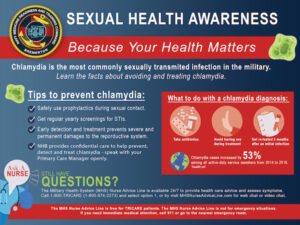
Story by Douglas Stutz
Naval Hospital Bremerton/Navy Medicine Readiness and Training Command Bremerton
There’s a host of communicable diseases which routinely impact active duty, retirees and dependents.
Form salmonella to norovirus to influenza, many communicable and infectious disease typically steal the media limelight, but there are other preventable and curative infections that should be highlighted.
NHB Public Health experts have indicated that there is a specific grouping of communicable – and infectious – bacterial and parasitic diseases which are on the upswing nation-wide.
Sexually Transmitted Infections, more commonly referred to as STIs, are considered a public health priority by the Centers for Disease Control and Prevention. If untreated, the most common types – syphilis, gonorrhea, trichomoniasis and chlamydia – fester, linger and cause lasting damage.
“Chlamydia is the most commonly reported sexually transmitted infection in the United States. It is caused by the bacteria Chlamydia trachomatis. It can infect both men and women,” said Cmdr. Carolyn Ellison, NHB Director for Public Health.
Compiled statistics shows that chlamydia is the number one most common bacterial sexually transmitted infection in the U.S. Navy and Marine Corps.
Chlamydia infection rates are also highest among sexually active young women 15-25 years of age. Many women do not even realize they have the infection since approximately 70 percent of cases are asymptomatic (affected but no symptoms showing). When symptoms do occur, they may not appear until several weeks later. When left untreated, the bacteria can cause severe and permanent damages to the reproductive system.
If there are symptoms, women could experience painful urination, unexpected vaginal discharge and unanticipated bleeding between periods. For men, symptoms could be burning urination, penile discharge and testicular swelling.
According to the Kitsap Public Health District, in Washington State, sexually transmitted infections are the most commonly reported communicable disease – even more so than foodborne illness, influenza and norovirus – with chlamydia the most frequently reported of the STIs in Kitsap as well as the entire U.S. Although the rate of cases is statistically and significantly lower in Kitsap than the rest of the state, the number of cases does continue to rise. In 2017, the rate was 418 cases per 100,000 residents, with 57 percent ages 19 to 25, with 63 percent of those cases in women. The number of cases from 2013 to 2017 was 4,852, with 474 of those from Navy ship commands.
NHB public health experts advocate that it is important for both males and females to get checked for chlamydia. Screening can be done with a swab test or urine test.
“Chlamydia infections can be treated with antibiotics. Early detection and treatment are effective in preventing severe and permanent damages to the reproductive system,” explained Ellison.
The age requirement varies from state to state. In the state of Washington teens who are 14 years or older do not need parental consent for STI testing.
Patients can request a screening test at their assigned clinic and from their primary care manager. A woman doesn’t need to have a pelvic exam for chlamydia screening. The test can be done with a urine sample.
Naval Hospital Bremerton provides confidential care and trusted service to help prevent, detect and treat chlamydia or any other STI. A chlamydia infection can usually be treated with oral antibiotics. The infection must be completely treated before engaging in sexual activity to avoid any reinfection.
Ellison also strongly advocates anyone treated also include their partner in getting timely and effective treatment.
To prevent chlamydia, protection by using condoms is stressed.
Ellison emphasizes for anyone with concerns to contact their command medical department, independent duty corpsman or primary care manager.